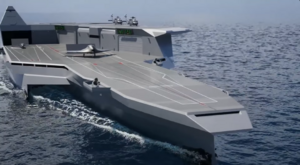Yong-Wang class unmanned aerial vehicle carrier: Difference between revisions
No edit summary |
No edit summary |
||
| Line 8: | Line 8: | ||
{{Infobox ship class overview | {{Infobox ship class overview | ||
|Name= Yong-Wang class unmanned aerial vehicle carrier | |Name= Yong-Wang class unmanned aerial vehicle carrier | ||
|Builders= | |Builders= Hanwha Ocean Co., Ltd. | ||
|Operators= {{flag|Joseon}} | |Operators= {{flag|Joseon}} | ||
|Class before= | |Class before= | ||
Revision as of 07:03, 15 August 2024

| |
| Class overview | |
|---|---|
| Name: | Yong-Wang class unmanned aerial vehicle carrier |
| Builders: | Hanwha Ocean Co., Ltd. |
| Operators: |
|
| Cost: | 2.5 billion NSD $ |
| Built: | 2021- |
| In service: | 2024-present |
| Planned: | 17 |
| Completed: | 5 |
| Active: | 1 |
| General characteristics | |
| Class and type: | Drone carrier |
| Displacement: | 23,000 tons, full load |
| Length: | 215 m |
| Beam: | 41 m |
| Draft: | 8.5 m |
| Propulsion: | CODLOG |
| Speed: | 32 knots(Maximum speed) |
| Range: | 12,964 km |
| Complement: | 40(Crews)+124(Airwing) |
| Sensors and processing systems: | 4 X S-Band AESA Radars |
| Electronic warfare & decoys: | LIG Nex1 SLQ-200(V)K SONATA ESM/ECM |
| Armament: |
|
| Armour: | Classified |
| Aircraft carried: | 24 UAVs or UCAVs + 6-12 Helicopters |
The Yong-Wang class unmanned aerial vehicle carrier is a ship designed and built to use aerial and maritime drones to perform sea blockings, air missions, anti-submarine missions, fleet battles, and more. The Yong-Wang class is one of the results of a project implemented by the Royal Joseon Armed Forces to prepare for future wars using drones as military drones gradually expand their role on the battlefield.
The Yong-Wang class is a type of drone carrier that acts as an operation and resupply platform for aerial and maritime drones and acts as a mothership to closely connect drones and control them. The operation and control of drones require human crew intervention, but artificial intelligence assists humans in combat assistance, battlefield environment analysis, and the operation of internal facilities of ships. In particular, since there are many areas where artificial intelligence(AI) is in charge of operating facilities inside ships, the Yong-Wang class can operate smoothly with only 40 crew members.
Description
Design
Defense capability
Air operational capability
Aerial wings
- 1 Air combat UCAV squadron (12 Aircraft. KMAQ-2 UCAV) + 1 Strike mission UCAV squadron (12 Aircraft. RAQ-39B Clarion)
- 1 Anti-Submarine warfare helicopter squadron (8 Helicopters. NUH-1)
Or
- 2 Air combat UCAV squadrons (24 Aircraft. AQ-46A Storm Petrel)
- 1 Anti-Submarine warfare helicopter squadron (8 Helicopters. NUH-1)
Unmanned surface vehicles